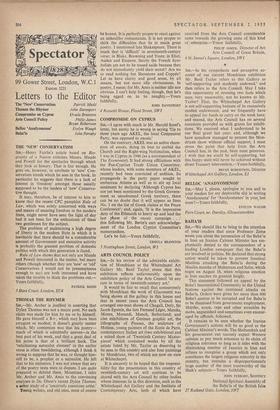THOMAS THE RHYMER
SIR,—Mr. Archer is justified in asserting that Dylan Thomas was not a major poet. No such claim was made for him by me or by himself. He gave himself a B+, which may have been arrogant or modest; it doesn't greatly matter which. My contention was that his poetry— much of which is admittedly uneven—is the best part of his work, and that a great deal of his prose is that of a brilliant hack. The 'vaticinating surrealist element' in the earlier verse is often bewildering, although I think it wrong to suppose that he was, or thought him- self to be, a prophet or a surrealist. He left that to his imitators. I was not aware that any of the poetry texts were in dispute. I am quite prepared to defend them. Meantime, I refer Mr. Archer and Mr. Amis to the convincing analyses in Dr. Olson's recent Dylan Thomas, a sober study of a 'creatively conscious artist.'
Young writers, and old ones, must of course be honest. It is perfectly proper to react against an unhealthy romanticism. It is not proper to shirk the difficulties that lie in much great poetry. I mentioned late Shakespeare. There is much that is 'difficult' in seventeenth-century verse; in Blake, Browning and Yeats; in Eliot, Auden and Empson. Surely the French Sym- bolists are not to be tossed aside because they do not immediately yield their secret? Are we to read nothing but Shcnstone and Coppee? Let us have clarity and good sense, by all means, but not mere idle obviousness. In poetry, I mean; for Mr. Amis is neither idle nor obvious. I can't help feeling, though, that he's being egged on to be naughty.—Yours faithfully,
JOHN DAVENPORT
4 Rossetti House, Flood Street, SW3


































 Previous page
Previous page